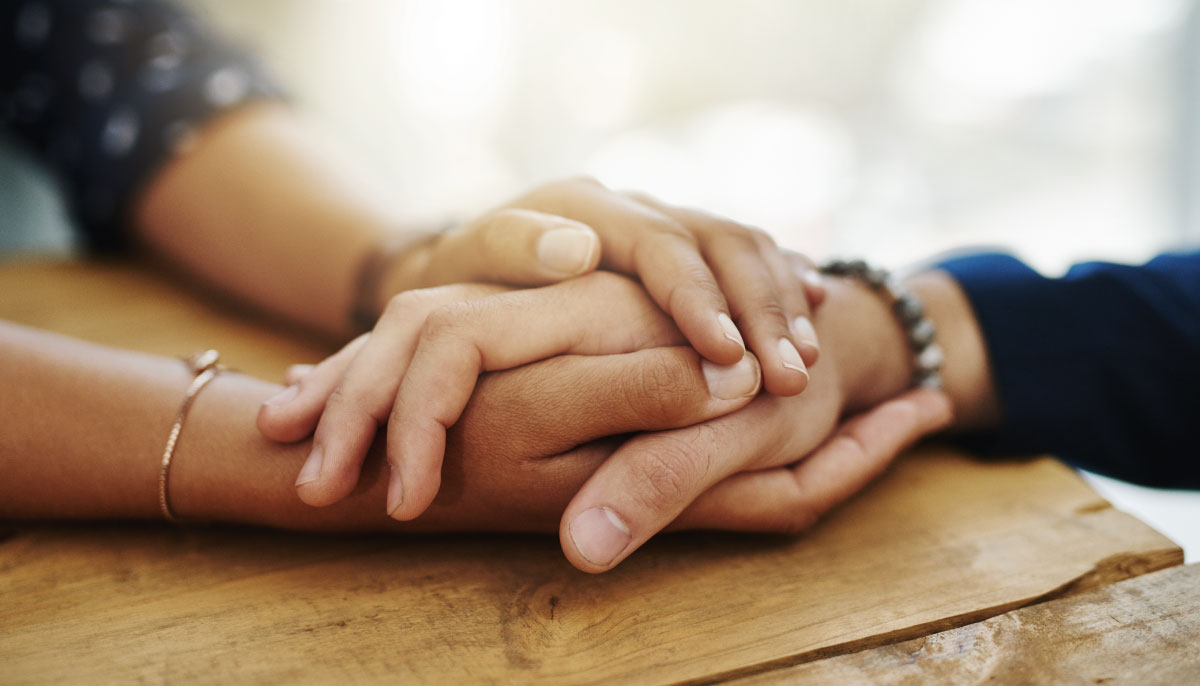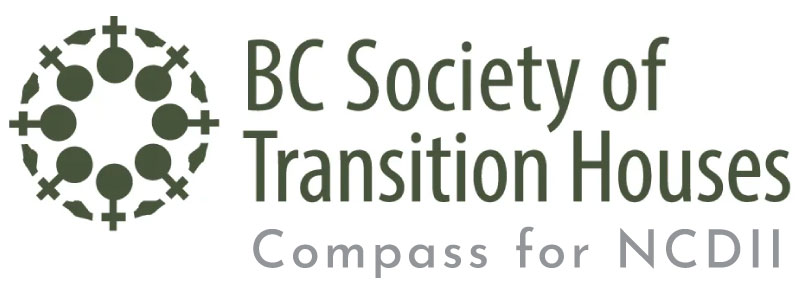Supporting Someone Experiencing NCDII
Supporting someone experiencing non-consensual image sharing can be a challenging and emotional experience, and you may feel as though you do not know how to begin.
There are resources available to help.

Tips for Supporting Someone Experiencing Non-Consensual Image Sharing
- Listen and respond without judgment. Sharing a non consensual violent experience is difficult and the person may be uncomfortable and feel vulnerable. Responding in a non-judgmental way is respectful. Non-judgmental responses include listening patiently, not questioning the person’s actions and allowing them to share information at their own pace.
- Remind them that the violence is not their fault, and that they are not alone. Tell them that you are there to support them in any way that feels right for them.
- Ask them how they would like to be supported. They may want someone to listen and validate their experience. Or, they may appreciate help with learning about options for taking action.
- Learn more about non-consensual image sharing. You have already taken an important step by searching for information about how to support someone whose image has been shared without their consent, or who is receiving threats that their image will be shared. On the other pages of this website, you can learn more about the legal and non-legal the options available to respond to non-consensual image sharing.
- Support their choices. There is no one-size-fits all resource for people whose images have been shared non-consensually. It is important that individuals make decisions and choices that are right for them, and that they feel supported in their decision-making with the recognition that responses will vary.
- Be kind to yourself. Whether a friend, parent, or anti-violence worker, it can be challenging and difficult to witness someone else’s experiences of violence. Take care and seek support if needed.
Supporting Someone Experiencing Non-Consensual Image Sharing
Tech Safety Canada: Supporting Others
Salal Sexual Violence Support Centre
Note: Salal provides many services, including:
- A 24 hour crisis line
- Text and Chat support
- Police and Court Accompaniment
- Counselling
- Specific counselling and support for Indigenous survivors
Poster/One Pager: Take it Down Now
Tech Safety Canada: Image-Based Abuse and the Non-Consensual Distribution of Intimate Images
Tech Safety Canada: Technology Safety and Victim/Survivor Resources
Tech Safety Canada: Conversation Starters for Tech Safety Planning
Tech Safety Canada: Preserving Digital Evidence Toolkit
Tech Safety Canada: Tech Safety Planning Toolkit
Supporting Children & Youth
The Learning Network | Supporting Youth Experiencing Technology-Facilitated Sexual Violence
Tech Safety Canada: Supporting Teens’ Experiences of Digital Dating Violence
Tech Safety Canada| Understanding Teens and Technology: Safety, Privacy, and Empowerment
Media Smarts: Resources for Parents
Media Smarts: Digital Issues Library
* (resources for youth & caregivers)
Kids Help Phone| Cyberbullying: How to support the young person in your life
Kids Help Phone: How to have an open conversation with a young person
eSafety Commissioner | Sending Nudes and Sexting
*A guide for adults and caregivers that provides guidance for many scenarios. Resource helplines in this article are Australian. For a list of BC and Canadian resources see below.
Thorn: Talking to your Kids about Sextortion
Thorn: Sextortion Resources for Educators
Kids help phone: Talking to the young person in your life about sexuality
Kids Help Phone: What to do when a young person confides in you
Media Smarts| Relationships and Technology: Sexting
The Learning Network | Coercive Control During Intimate Partner Violence: What about children?
Community-Specific Support
The Learning Network
*Includes a library with many tailored and specific resources
The Learning Network: Sexual Violence Against Black Women and Girls in a #MeToo Era
Toronto Metropolitan University: Hea
Toronto Metropolitan University: We are Spectacular Nebulas in Healing Journal
Toronto Metropolitan University | We Heal Together: A Colouring Book for Black Survivors
Disability Alliance of BC: Anti-Violence Resources (in French and English)
Tech Safety Canada: Digital Assistive Technology Toolkit
Article | The Conversation: Technology-Facilitated Abuse of Aboriginal and Torres Strait Island Women
Note: This is an Australian article, but many points overlap with the Canadian Context. It may be helpful in understanding the experiences of Indigenous women and girls with technology-facilitated gender-based violence.
Tech Safety Canada: Supporting Indigenous Teens Through Digital Dating Violence
Having a Safe Online Presence after Leaving Your Community
Tech Safety Canada: Tech Safety Planning Tips for Indigenous Survivors Leaving a Community
Tech Safety Canada: Tech Abuse Poster 8.5 x 11 (Inuktitut)
Tech Safety Canada: Tech Abust Poster 11 x 17 (Inuktitut)
Tech Safety Canada: Tech Safety Planning Tools in Inuktitut
Tech Safety Canada: Tech Safety Planning Tools in Spanish
Tech Safety Canada: Sécurité Technologique Canada (French Website)
Woman Act | Promising Practices for Agencies to Engage Older Women
The Learning Network: Support Rainbow Seniors! 3 things for Service Providers to Know
The Learning Network: Trans Women and Intimate Partner Violence Fundamentals for Service Providers
Government of BC: Safe Campuses BC
Some of BCSTH’s member programs provide specialized support for specific communities (e.g., people without status, Newcomer Women, Francophones, and Indigenous people), in addition to their regular services.
You can use BCSTH’s member directory to find support services aligned with your needs. On the website, you can search for support organizations by region, city, and program. You can also filter out results that provide specific support services. Some of these organizations include:
Inform’Elles serves francophone women experiencing gender-based violence in BC.
DIVERSEcity Community Resources Society Supports newcomers and other diverse communities.
Progressive Intercultural Community Services (PICS) Society provides a wide range of programs and services that support new immigrants, seniors, farm workers, women and youth.
Vancouver & Lower Mainland Multicultural Family Support Services Society offer assistance to immigrants, refugees, visible minorities, and women without immigration status and children facing family violence within the Metro Vancouver area.
Nisa Foundation supports women of color, Muslim women, immigrants, refugees and those without status.
Community Supports & Resources
There are supports & resources available to those experiencing NCDII and the people supporting them. Here is a list of resources.
Support for People Impacted by Non-Consensual Distribution of Intimate Images
The Intimate Image Protection Service provides support to people in BC whose images have been shared without their consent. Available by email or phone (8:30 AM-4:30PM).
Victim Link BC is a free, confidential, and multilingual 24 hour service that provides phone, text, and email support including referrals and immediate crisis support to victims of crime. You can contact Victim Link BC even if you are not sure if you’ve experienced a crime.
Salal Sexual Violence Support Centre provides free support for survivors of sexualized violence, including survivors of technology-facilitated violence (such as NCDII). They offer a 24 hour crisis line, Text and Chat support, Police and Court Accompaniment, Counseling, and Specific counseling and support for Indigenous survivors.
The Canadian Centre for Child Protection provides immediate help and prevention education to address the victimization of children and support those who have experienced violence.
Cybertip.ca is a tipline for reporting online child sexual abuse and exploitation.
Need Help Now provides resources and support for Canadian youth who have experienced the non-consensual distribution of intimate images, luring, sextortion, or other forms of online sexual violence.
You can find a Transition House, Second Stage House, or Third Stage House near you on BCSTH’s membership directory.
Crisis Lines & Counseling
PEACE Program for Children and Youth is a counseling program for children and youth experiencing violence.
Kid Help Phone crisis line is available 24/7 by call or text.
KUU-US Crisis Line Society is a crisis phone line for Indigenous Elders, Adults, and Youth.
VictimLink BC is a referral and information service for victims of crime.
Crisis Centre BC is a crisis phone line that offers 24 hour support in many languages. You don’t need to be thinking about suicide to use this service. 1-800-SUICIDE/ 1-800-784-2433.
The National Suicide Crisis Helpline offers 24 hour support. Call or text 9-8-8 for phone or chat support.
BC Mental Health Support Line– A 24 hour line for immediate mental health support or referral. Call 310-6789 (no area code)
The Crime Victim Assistance Program may be able to help victims and their family members with expenses for victims of violent crime, such as funds for support and counseling. You can apply to the program as soon as a crime against you has taken place, even before criminal proceedings begin.
Legal Support
Society for Children and Youth BC’s Child and Youth Legal Centre provides legal support for children and youth.
Access Pro Bono Society of British Columbia offers free legal advice throughout BC.
UBC Indigenous Community Legal Clinic provides free legal services to the Indigenous community, and is located in Vancouver’s Downtown Eastside.
The UBC Law Students’ Legal Advice Program provides free legal advice and representation to clients in the lower mainland.
Rise Women’s Legal Centre provides accessible legal services to self-identifying women and gender-diverse clients. They tend to have a focus in family law.
Tech Safety Support & Image Removal
Take it Down Now is an image removal service that supports survivors who were under the age of 18 when the image they are worried about was taken.
Tech Safety Canada offers Canada-wide resources on technology-facilitated gender-based violence for survivors and frontline workers
The BCSTH Tech Safety Project provides tech safety resources for survivors and anti-violence workers in BC.
The White Hatter provides resources and education on digital literacy and internet safety. They provide online resources and have a phone line for support.
Stop NCII is an image removal service for survivors over the age of 18.
